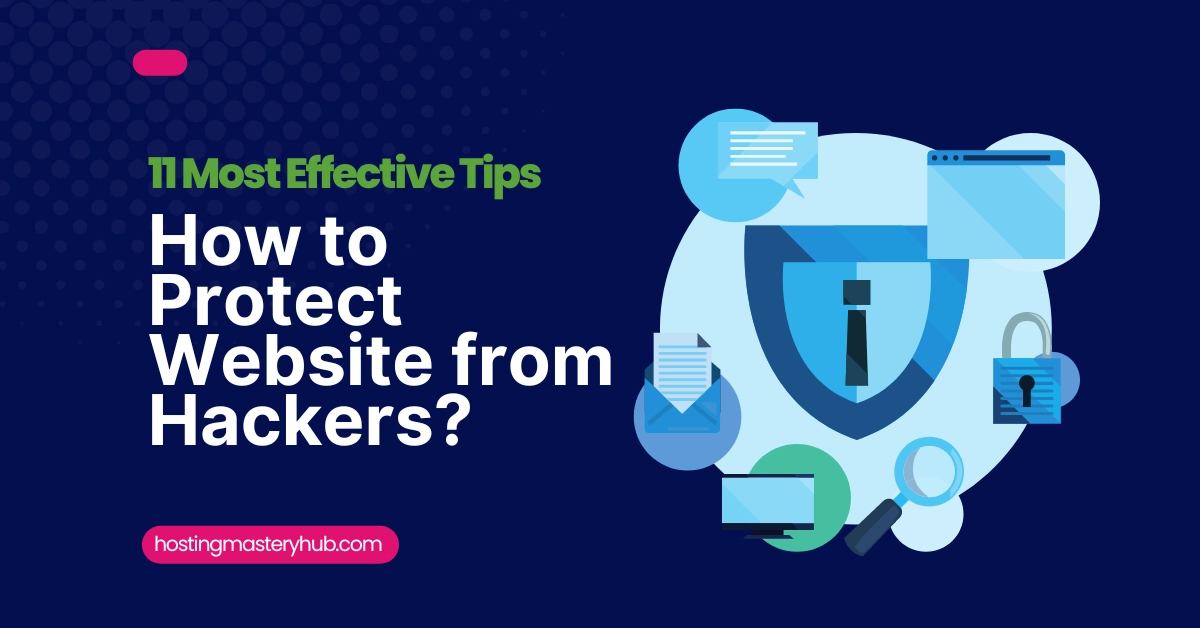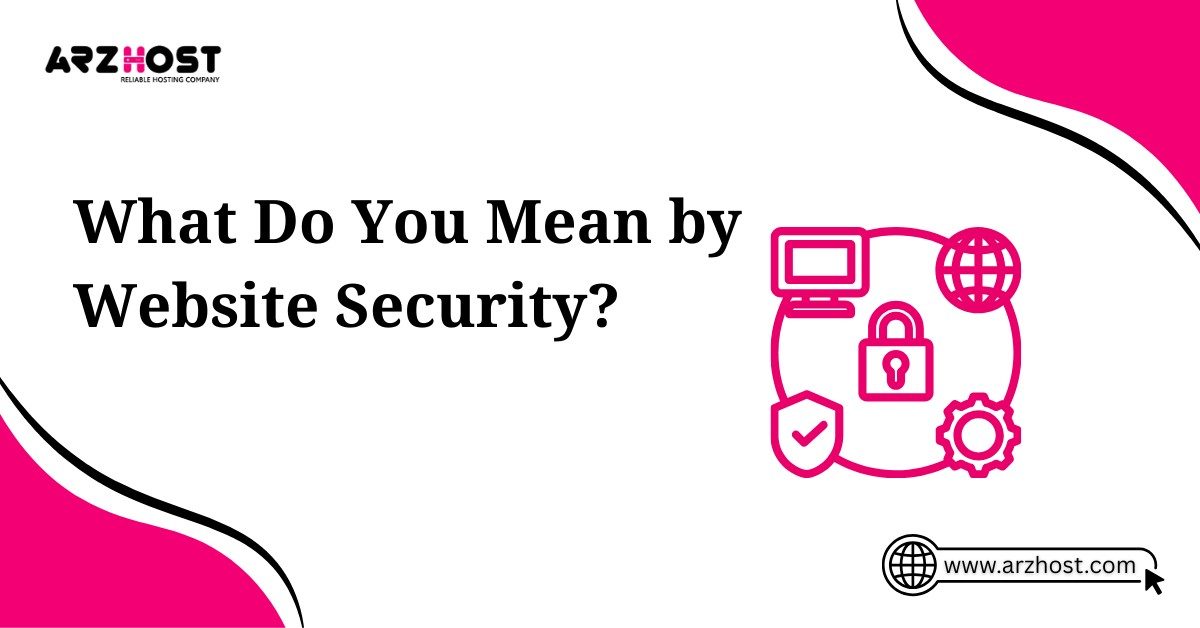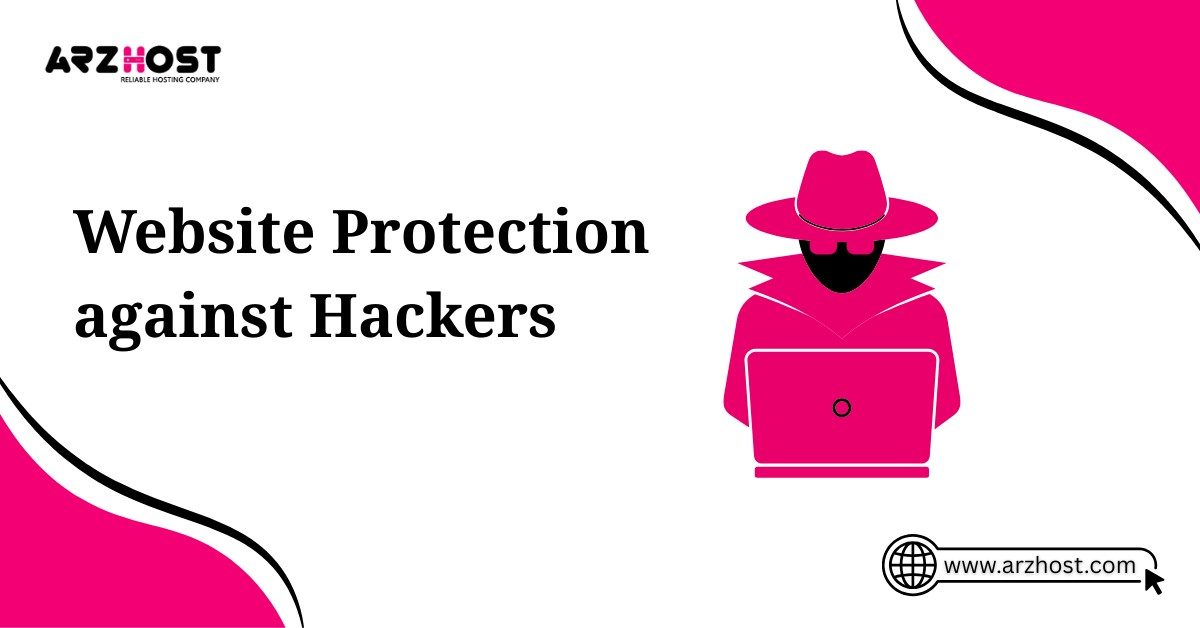
Businesses interact with their customers via social media platforms or their websites in this era of the global economy’s rapid digital transformation.
Users can purchase goods or services, get in touch with corporate personnel, see all recent changes, view special deals, and more by visiting the company’s website.
When a business’s website is down, it suffers serious financial and reputational damage. And dishonest competitors and bad actors know it. Hackers attack business websites either at the request of rival companies or in an attempt to obtain a ransom payment.
For this reason, “How to Protect Website from Hackers” is one of the most frequent queries that businesses ask cybersecurity specialists.
Through this content, ARZ Host hopes to educate you on the dangers of compromised websites as well as the steps businesses may take to protect their online property from hackers.
Website security refers to the protection of online platforms from unauthorized access, modification, disruption, or destruction. Essentially, it’s all about building a fortress for your website against malicious intruders and keeping everything within it safe and sound.

Here are some key aspects of website security:
Website security is not a one-time fix; it’s an ongoing process. It requires constant vigilance, updates, and adaptation to new threats.
To effectively secures your website, consider:
I hope this explanation clarifies what website security involves. Remember, keeping your website secure is vital for maintaining its integrity, protecting your users’ data, and earning their trust.
If you have any further questions or want to delve deeper into specific aspects of website security, feel free to ask!
Now, let’s explore the strategies about how to protect website from hackers:
You can find a wealth of important information on your website these days, as it’s more than simply an online store. Keeping sensitive data out of the hands of evil actors is essential, whether it concerns proprietary content, customer data, or secret projects.
But where do you start when dealing with cyber threats that are always changing? In order to protect your website from hackers and guarantee its constant security, this thorough tutorial explains 11 essential strategies:
Think of an SSL certificate as a bouncer for your website. It encrypts communication between your visitors and your server, ensuring sensitive information like passwords and credit card details stay safe from prying eyes.
Security plugins go the extra mile, providing real-time monitoring for suspicious activity, vulnerability scanning, and malware detection. Choose a reputable plugin with a wide range of features and regularly update it to stay ahead of the curve.
This goes beyond just your antivirus program. Ensure your website’s content management system (CMS), plugins, and server software are always updated with the latest security patches.
These updates often address vulnerabilities discovered by hackers, effectively plugging any potential entry points. Automate updates wherever possible to minimize the risk of human error.
Ditch the birthday cake and pet’s name! Opt for complex, random passwords with a mix of uppercase and lowercase letters, numbers, and special characters.
A password manager can be your best friend here, generating and securely storing unique passwords for all your accounts.
Resist the temptation to reuse passwords across different platforms, as a breach on one site can leave others vulnerable.
Remember HTTP? It’s time to graduate to HTTPS, the secure version of the protocol. With HTTPS, communication between your website and visitors is encrypted, safeguarding data while boosting your website’s ranking in search results.
Most hosting providers offer simple ways to enable HTTPS, so make the switch and watch your security and SEO soar.
Hacker’s love luring unsuspecting users into revealing sensitive information through phishing emails. Before clicking any suspicious links or downloading attachments, verify the sender’s email address, check for spelling and grammatical errors, and hover over links to see their true destinations.
Remember, legitimate companies rarely request urgent action via email. Always err on the side of caution and report suspicious emails to your hosting provider.
Not all user-generated content is welcome. Implement measures to restrict the types of files users can upload to your website and the size of those files. This can help prevent malicious code injection and protect your server from overload.
Consider whitelisting specific file extensions and setting size limits to maintain control over your digital domain.
Utilize website security tools that scan your site for vulnerabilities, malware, and suspicious activity. These tools can act as your tireless guard, alerting you to potential threats before they evolve into full-blown breaches.
Choose a tool that complements your existing security measures and offers ongoing monitoring to ensure constant vigilance.
No one likes to think about their website being hacked, but having regular backups can be a lifesaver. Schedule automatic backups of your website’s files and database so you can quickly restore your site to a clean state in case of an attack.
Choose a secure backup location, preferably off-site, to ensure you have access to a clean copy even if your server is compromised.
Your web hosting provider plays a crucial role in your website’s security. Do your research and choose a reputable provider with robust security measures in place, like firewalls, intrusion detection systems, and malware scanning.
Look for providers who offer regular backups and vulnerability assessments to give you peace of mind.
Every plugin adds another potential entry point for hackers. Resist the urge to install every shiny plugin that comes your way. Only use plugins that are absolutely essential for your website’s functionality, and keep them updated with the latest versions.
Regularly deactivate and delete unused plugins to minimize your attack surface.
Don’t set and forget. Schedule regular penetration testing for your website by reputable security professionals. These tests simulate attacker actions, identifying vulnerabilities and potential weaknesses in your website’s defenses.
By proactively addressing these issues, you can stay ahead of the hackers and maintain a robust security posture.
Do not forget that maintaining website security requires constant attention. You can create a strong wall around your website that will prevent even the most determined hackers by putting these 11 suggestions into practice and developing a security-conscious mindset.
Remember that your website is your priceless shelter in the always-changing internet world, so keep it maintained alert, and focused on its security.
Businesses can avoid having to spend extra money to fix their websites‘ malfunctioning after hacks by safeguarding them from viruses and hackers.
Cyberattacks that target small and medium-sized organizations’ websites can cause too much damage for them to recover to their pre-attack levels of performance.

Additionally, search engines may ban websites involved in significant data breaches; consequently, businesses may see a sharp drop in the number of new customers they receive.
On the other hand, businesses that protect their websites provide the framework that will lead to an improvement in their SEO rankings. For instance, businesses can stop rogue bots from blocking actual visitors to their websites by putting in place DDoS security mechanisms.
Protect their users’ information, including names, email addresses, credit card numbers, dates of birth, phone numbers, and other details, by first safeguarding their websites against hacking companies. Cybercriminals often target business websites in an effort to insert malware that customers would ultimately download onto their devices.
Customers are likely to lose faith in a business and cease using its services or purchasing its goods if they learn that it has not stored their data securely.
Businesses that have neglected to keep their websites safe from hackers may find themselves the target of bad press. Newspapers and trade publications give data breach stories a lot of coverage.
A corporation that has not taken precautions to secure its website from hackers is not a trustworthy business partner, and this unfavorable media coverage will serve as a signal to other players in the market and investors. The company’s growth will consequently slow down, and it might possibly be required to leave the market.
Businesses that successfully safeguard their websites have an added edge over rivals in the market. When competitors are experiencing operational difficulties as a result of several cyberattacks directed against the industry, having a well-secured website is an opportunity for you to maintain your excellent performance.
By protecting their websites from hackers, companies also free up key personnel to concentrate on driving business expansion and enhancing user experience rather than troubleshooting security flaws.
The most precious resource for a company is time, and one of the best ways to guarantee that employees are allocating their time sensibly is to secure websites.
Hackers never stop adding new tools to their disposal for breaking into websites. Because of this, the extent of possible harm that contemporary cyberattacks on business websites could cause is frequently unknown.
Thus, one of the most important things businesses can do to reduce uncertainty is to prevent website hacking.
In general, any trustworthy business that prioritizes maintaining its reputation needs to be aware of how to keep its website safe from hackers.
The World Wide Web consists of more than 1.2 billion websites as of 2021. It is not feasible to analyze every website’s security simultaneously, however, Google Safe Browsing gives more than 3 million warnings every day.
The security company Sucuri’s research shows that between 1% and 2% of the websites it scans have some kind of compromise that could be a sign of a cyberattack.
Therefore, if one applies this percentage to the total number of websites that exist worldwide, at least 12 million websites are probably compromised or infected at any given time. When it comes to businesses, around 64 percent of them globally acknowledge that they have experienced online attacks.
Three types of cyberattacks are commonly used by hackers to compromise websites: third-party integrations, software vulnerability exploitation, and access control. A variety of strategies are being used by malicious actors to access vulnerable login locations.
When a hacker attempts to guess username and password combinations, one of the most popular ways to get access is by brute force attacks. Hackers also use social engineering techniques.
Phishing websites are designed to trick people into entering their actual login credentials. Malicious actors’ main objective is to use logins to gain direct access to resources that they have targeted.
Corporate websites sometimes have problems them that don’t impair the user experience, but hackers can exploit these bugs with severe results.
Remote code execution, remote/local file inclusion, and SQL injection are the most popular methods used by hackers to take advantage of software flaws to compromise a website.
Numerous interrelated technologies, such as web servers and infrastructure, that a website depends on potentially have software vulnerabilities. Additionally, it’s possible to consider third-party extensions like plugins and themes as potential entry points.
The main problem with third-party integrations and services is that website owners cannot regulate them, and there is a significant danger to security when hostile actors take advantage of them.
DDoS attacks are one of the most popular methods used by bad actors to take down certain websites. Attackers flood servers with malicious traffic by using botnets. Hackers can also obtain user information by using DDoS attacks to freeze user forms.
Attacks using cross-site scripting are also referred to as XSS attacks. These attacks are the result of hostile individuals injecting malicious code into a trustworthy website.
An attacker can therefore access all of the data kept on a website. There are two different kinds of cross-site scripting (XSS) attacks: reflected and stored.
Attacks like these are known as stored XSS attacks since the malicious script is retained on the server indefinitely. Reflected XSS attacks are those that happen when scripts are bounced off web servers in disguise as of search results or warnings.
In order to change the traffic’s destination, malicious website hacking techniques like DNS spoofing include introducing tainted domain system data into a DNS resolver’s cache.
Therefore, traffic from trustworthy websites is being diverted to illegal ones that host malware. Malicious actors also use DNS fraud to obtain data about the traffic that has been confused.
Sometimes, as opposed to targeting a specific website, hackers target a flaw in a content management system, plugin, or template. For example, they might target weaknesses in a certain WordPress or Joomla version.
All things considered; website hacking is one of the biggest cybersecurity threats facing businesses across a range of industries.
A business’s long-term competitiveness may be negatively impacted by neglecting to secure its website against viruses and hackers, which can also have detrimental effects on the business’s finances, reputation, and technical standing. Website security is a top priority for many businesses.
However, companies that don’t use security vendors should be aware that hackers use a variety of techniques and technologies to compromise websites. As a result, their online resource security may be underestimated.
There are general guidelines that businesses can follow to greatly reduce the likelihood that their websites will be weakened, as well as customized solutions like ARZ Host Certification that offer unique security solutions to each client because each business faces different risks when it comes to their websites.
Businesses that work to protect their websites from hackers should understand that implementing security is generally one of the most sensible moves they can make to improve their reputation, profitability, and competitiveness.